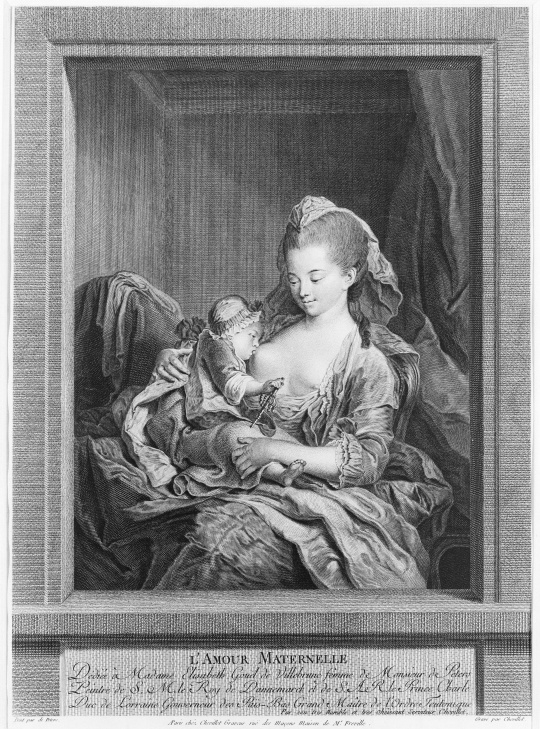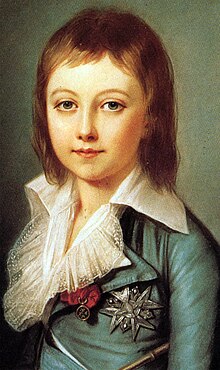Marlbrough s'en va-t-en guerre
Piosenka Marlbrough s'en va-t-en guerre ( Marlbrough poszedł na wojnę) została napisana w 1709 roku, po bitwie pod Malplaquet. Słowa piosenki zostały zainspirowane pogłoską, według której John Churchill, pierwszy książę Marlborough zginął.
Adriaen van der Werff - Książę Marlborough (1650–1722)

Louis Laguerre - Bitwa pod Maplaquet

Louis Laguerre - Zwycięscy książęta w zdobytych fortyfikacjach francuskich

Bitwa pod Malplaquet (11 września 1709) była jedną z najważniejszych bitew podczas wojny o sukcesję hiszpańską. Francja przegrała z koalicją angielsko-holendersko-austriacką, ale zwycięstwo koalicji było pyrrusowe. Marszałek de Villars napisał do króla Francji:
Jeśli Bóg w swej łaskawości pozwoli nam przegrać jeszcze jedną taką bitwę, Wasza Królewska Mość może liczyć, że nieprzyjaciel zostanie całkowicie zniszczony.
Piosenka Marlbrough s'en va-t-en guerre nie była dobrze znana w I połowie XVIII wieku. Dopiero od roku 1780 nagle stała się popularna. Ludwik XVII (syn Ludwika XVI i Marii Antoniny, narodzony w 1785 roku) był wychowywany przez Madame Poitrine. Kiedy kołysała jego kołyskę śpiewała Marlbrough s'en va-t-en guerre; Ludwik XVII, słysząc imię generała, otworzył oczy. Melodia spodobała się królowej i również zaczęła to śpiewać. Po niej powtarzali wszyscy inni i piosenka osiągnęła niesamowitą popularność.
Matczyna miłość, portret pani Poitrine

Alexander Kucharsky - Ludwik XVII (1792)

Piosenka Marlbrough s'en va-t-en guerre
Polskie tłumaczenie:
Malbrough poszedł na wojnę (Śmierć i pogrzeb niezwyciężonego Malbrough)
Malbrough poszedł na wojnę,
Mironton, mironton, mirontaine,
Malbrough poszedł na wojnę,
Nie wie kiedy wróci. {3x}
Wróci do Wielkanocy,
Mironton, mironton, mirontaine,
Wróci do Wielkanocy,
Albo do Święta Trójcy Świętej.
Święto Świętej Trójcy przeminęło,
Mironton, mironton, mirontaine,
Święto Świętej Trójcy przeminęło,
Malbrough nie wrócił.
Księżna weszła na wierzę,
Mironton, mironton, mirontaine,
Księżna weszła na wierzę,
Tak wysoko, jak to możliwe.
Dostrzegła przychodzącego gońca,
Mironton, mironton, mirontaine,
Dostrzegła przychodzącego gońca,
Ubranego na czarno.
O gońcu, o mój dobry gońcu,
Mironton, mironton, mirontaine,
O gońcu, o mój dobry gońcu,
Jaką nowinę przynosisz?
Przez nowinę, którą przynoszę,
Mironton, mironton, mirontaine,
Przez nowinę, którą przynoszę,
Twoje piękne oczy będą płakać.
Porzuć swoje różowe stroje,
Mironton, mironton, mirontaine,
Porzuć swoje różowe stroje,
I satynowe tkaniny.
Pan Malbrough zginął,
Mironton, mironton, mirontaine,
Pan Malbrough zginął,
Jest martwy i pogrzebany.
Widziałem, jak był pogrzebany,
Mironton, mironton, mirontaine,
Widziałem, jak był pogrzebany,
Przez czterech oficerów.
Jeden niósł jego napierśnik,
Mironton, mironton, mirontaine,
Jeden niósł jego napierśnik,
Inni jego tarczę.
Jeden niósł jego szablę,
Mironton, mironton, mirontaine,
Jeden niósł jego szablę,
Inny nie niósł nic.
Przy jego grobie,
Mironton, mironton, mirontaine,
Przy jego grobie,
Posadzono rozmaryn.
Na jego najwyższych gałęziach,
Mironton, mironton, mirontaine,
Na jego najwyższych gałęziach,
Słowik śpiewał.
Widzieliśmy, jak jego dusza odlatuje,
Mironton, mironton, mirontaine,
Widzieliśmy, jak jego dusza odlatuje,
Przez laury.
Każdy położył się na ziemi,
Mironton, mironton, mirontaine,
Każdy położył się na ziemi,
A potem każdy wstał.
Żeby śpiewać o zwycięstwach,
Mironton, mironton, mirontaine,
Żeby śpiewać o zwycięstwach,
Które odniósł Malbrough.
Ceremonia się skończyła,
Mironton, mironton, mirontaine,
Ceremonia się skończyła,
Każdy poszedł spać.
Niektórzy z ich żonami,
Mironton, mironton, mirontaine,
Niektórzy z ich żonami,
A niektórzy sami.
To nie dlatego, że było tylko kilku,
Mironton, mironton, mirontaine,
To nie dlatego, że było tylko kilku,
Ponieważ znałem wielu.
Blondyni i bruneci,
Mironton, mironton, mirontaine,
Blondyni i bruneci,
I szatyni również.
Nie powiem więcej o tym,
Mironton, mironton, mirontaine,
Nie powiem już więcej o tym,
Bo to już wystarczy.
Francuska wersja:
Malbrough s'en va-t-en guerre (Mort et convoi de l'invincible Malbrough)
Malbrough s'en va-t-en guerre,
Mironton, mironton, mirontaine,
Malbrough s'en va-t-en guerre,
Ne sais quand reviendra. {3x}
Il reviendra-z-à Pâques,
Mironton, mironton, mirontaine,
Il reviendra-z-à Pâques,
Ou à la Trinité {3x}
La Trinité se passe,
Mironton, mironton, mirontaine,
La Trinité se passe,
Malbrough ne revient pas.
Madame à sa tour monte,
Mironton, mironton, mirontaine,
Madame à sa tour monte,
Si haut qu'elle peut monter.
Ell' voit venir son page,
Mironton, mironton, mirontaine,
Ell' voit venir son page,
Tout de noir habillé.
"Beau page, mon beau page,
Mironton, mironton, mirontaine,
Beau page, mon beau page,
Quelles nouvell's apportez?"
"Aux nouvell's que j'apporte,
Mironton, mironton, mirontaine,
Aux nouvelle's que j'apporte,
Vos beaux yeux vont pleurer.
Quittez vos habits roses,
Mironton, mironton, mirontaine,
Quittez vos habits roses,
Et vos satins brochés.
Monsieur Malbrough est mort,
Mironton, mironton, mirontaine,
Monsieur Malbrough est mort,
Est mort et enterré.
J' l'ai vu porter en terre,
Mironton, mironton, mirontaine,
J' l'ai vu porter en terre,
Par quatre-z-officiers.
L'un portait sa cuirasse,
Mironton, mironton, mirontaine,
L'un portait sa cuirasse,
L'autre son bouclier.
L'un portait son grand sabre,
Mironton, mironton, mirontaine,
L'un portait son grand sabre
L'autre ne portait rien.
A l'entour de sa tombe,
Mironton, mironton, mirontaine,
A l'entour de sa tombe,
Romarins fut planté.
Sur la plus haute branche,
Mironton, mironton, mirontaine,
Sur la plus haute branche
Un rossignol chantait.
On vit voler son âme,
Mironton, mironton, mirontaine,
On vit voler son âme
Au travers des lauriers.
La cérémonie faite,
Mironton, mironton, mirontaine,
La cérémonie faite,
Chacun s'en fut coucher.
Les uns avec leurs femmes
Mironton, mironton, mirontaine,
Les uns avec leurs femmes,
Et les autres tout seuls!
Mironton, mironton, mirontaine,
Malbrough s'en va-t-en guerre,
Ne sais quand reviendra. {3x}
Il reviendra-z-à Pâques,
Mironton, mironton, mirontaine,
Il reviendra-z-à Pâques,
Ou à la Trinité {3x}
La Trinité se passe,
Mironton, mironton, mirontaine,
La Trinité se passe,
Malbrough ne revient pas.
Madame à sa tour monte,
Mironton, mironton, mirontaine,
Madame à sa tour monte,
Si haut qu'elle peut monter.
Ell' voit venir son page,
Mironton, mironton, mirontaine,
Ell' voit venir son page,
Tout de noir habillé.
"Beau page, mon beau page,
Mironton, mironton, mirontaine,
Beau page, mon beau page,
Quelles nouvell's apportez?"
"Aux nouvell's que j'apporte,
Mironton, mironton, mirontaine,
Aux nouvelle's que j'apporte,
Vos beaux yeux vont pleurer.
Quittez vos habits roses,
Mironton, mironton, mirontaine,
Quittez vos habits roses,
Et vos satins brochés.
Monsieur Malbrough est mort,
Mironton, mironton, mirontaine,
Monsieur Malbrough est mort,
Est mort et enterré.
J' l'ai vu porter en terre,
Mironton, mironton, mirontaine,
J' l'ai vu porter en terre,
Par quatre-z-officiers.
L'un portait sa cuirasse,
Mironton, mironton, mirontaine,
L'un portait sa cuirasse,
L'autre son bouclier.
L'un portait son grand sabre,
Mironton, mironton, mirontaine,
L'un portait son grand sabre
L'autre ne portait rien.
A l'entour de sa tombe,
Mironton, mironton, mirontaine,
A l'entour de sa tombe,
Romarins fut planté.
Sur la plus haute branche,
Mironton, mironton, mirontaine,
Sur la plus haute branche
Un rossignol chantait.
On vit voler son âme,
Mironton, mironton, mirontaine,
On vit voler son âme
Au travers des lauriers.
La cérémonie faite,
Mironton, mironton, mirontaine,
La cérémonie faite,
Chacun s'en fut coucher.
Les uns avec leurs femmes
Mironton, mironton, mirontaine,
Les uns avec leurs femmes,
Et les autres tout seuls!
Ce n'est pas qu'il en manque,
Mironton ton ton mirontaine,
Ce n'est pas qu'il en manque,
Car j'en connais beaucoup.
Des brunes et puis des blondes,
Mironton ton ton mirontaine,
Des brunes et puis des blondes,
Et des châtaignes aussi.
Mironton, mironton, mirontaine
J' n'en dis pas davantage,
Car en voilà-z-assez!
Car en voilà-z-assez!
Późniejsze nawiązania do tej piosenki:
- Sonata (D-major) na altówkę - Carl Stamitz (1780) https://www.youtube.com/watch?v=XHcz5dJ4GXI
- Zwycięstwo Wellingtona -Ludwig van Beethoven ( 1813) https://www.youtube.com/watch?v=mczvfByofiw
- Zbrodnia i kara - Fiodor Dostojewski ( kiedy Katerina Ivanovna Marmeladova zachęca dzieci do śpiewania rosyjskiej wersji tej piosenki publicznie)
Brak komentarzy:
Prześlij komentarz